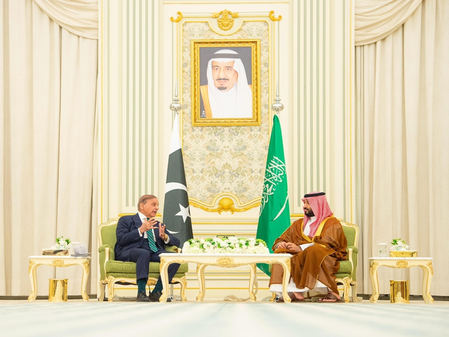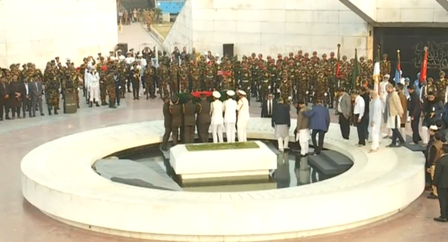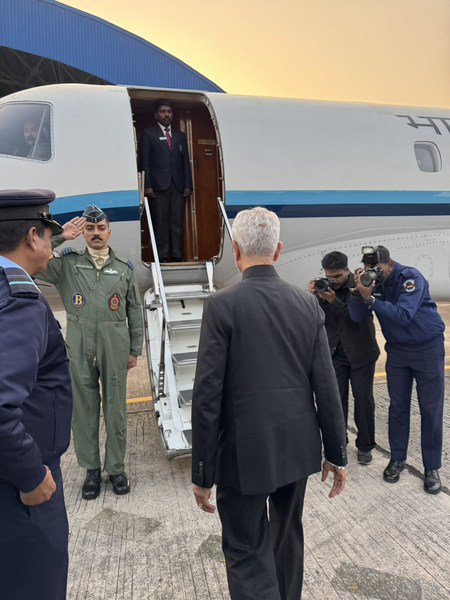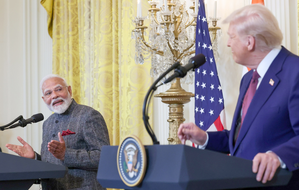
New Delhi, Sep 28 (IANS) On September 17th, Saudi Arabia and Pakistan took the world by surprise when they announced their Strategic Mutual Defence Agreement. The much-talked-about agreement formalises the collective defence principle between the two Asian countries, which means that aggression against either country shall be considered an aggression against both.
This might strike a chord in everyone’s mind, as we are all aware of a similar clause (Article 5) that is central to the North Atlantic Treaty Organisation (NATO), which states that an attack against one member country of the alliance will be considered an attack against all member countries. So, is this the start of a similar military alliance aimed at protecting and defending the rights of the Islamic Nations? The answer is a bit tricky.
The relationship between Riyadh and Islamabad is neither new nor as superficial as it is usually claimed to be. For decades, the Kingdom of Saudi Arabia has played the role of benefactor.
It has extended loans, subsidised oil, and bailouts whenever Pakistan’s economy fell flat and needed help. Pakistan, in turn, stationed troops in the kingdom, trained its military, and quietly stood as a potential nuclear safety net in case Riyadh needs such an assurance, ever.
Another reason for this religious solidarity, as claimed by Pakistanis, is the role of Saudi Arabia as the custodian of Islamic holy sites and Pakistan’s role as the self-proclaimed “fortress of Islam”. Until now, this relationship thrived informally, with gestures of support, tacit understandings, and episodic transfers of money or manpower.
This pact, between Saudi Arabia and Pakistan, formalises the already existing bonds; it just turns the implicit fraternity into an explicit treaty that alters how the region perceives their commitments.
For Pakistan, the agreement is a symbolic victory that restores a measure of status and self-esteem and for Saudi Arabia, it is a hedge, a message of autonomy and reassurance in an unstable Gulf
However, this move has not gone unnoticed by other players in the Arab world. In Egypt, for instance, it has stirred up debate. Since they believe that it undermines their own 2015 proposal for a unified Arab army, which Cairo had envisioned as an “Arab NATO”.
Egyptian commentators question why Saudi Arabia did not sign a defence pact with Egypt itself, or better still, build up its own indigenous military capacity.
The underlying frustration stems from the fact that Riyadh chose Islamabad over Cairo, despite Egypt’s long-standing ambition to lead a pan-Arab security framework. The irony here is hard to miss — Egypt, a US ally receiving nearly $1.3 billion annually in American military aid, is already deeply embedded in NATO-led security structures, with active partnerships and joint exercises with Western militaries.
For Riyadh, then, Pakistan offered a less complicated, more dependable partner, one that has been supplying troops and advisors for decades, with 1,500–2,000 Pakistani personnel still deployed in Saudi Arabia today.
India’s reaction has so far been cautious. The Ministry of External Affairs noted that such discussions had been anticipated and promised to “study the implications carefully”. Retired diplomats have been more blunt.
Former foreign secretary Kanwal Sibal called the pact a “grave misstep,” arguing it could embolden Pakistan, invite Saudi financing for its military, and shield Islamabad from consequences in future crises.
The concern in New Delhi is not limited to conventional conflict. Should Pakistan perceive Riyadh’s support as diplomatic cover, it might feel freer to test India’s patience through cross-border provocations or proxy activity.
For Indian policymakers, the worry isn’t just the risk of security flare-ups. There’s also the uneasy thought that years of patient diplomacy in the Gulf, building strong equations with the UAE, Israel, and, more recently, Saudi Arabia, could begin to fray if Riyadh’s tilt toward Pakistan goes beyond symbolism.
For India, the pact lands as a challenge, a quiet reminder that even its most trusted partners in West Asia move within shifting alliances and overlapping loyalties.
The ripple effects extend well beyond South Asia. Israel might see the pact through the prism of its own fragile balancing with Riyadh and might be concerned that Saudi’s alignment with Pakistan complicates prospects for normalisation in the region.
Iran interprets it as a reinforcement of Sunni solidarity at odds with its own influence in the region. For bigger players like Washington and Beijing, it can be read in two ways at once: an irritation to existing plans, but also a fresh opening to push their own influence.
The United States, still the Gulf’s primary security provider but increasingly wary of over-commitment, must now contend with a partner signalling that it can forge independent military guarantees. China, by contrast, stands to benefit.
Already Pakistan’s “all-weather” ally and a growing investor in Saudi Arabia’s Vision 2030 projects, Beijing is positioned to leverage this alignment to widen its footprint and, potentially, dilute India’s influence. The pact is thus more than a bilateral document: it inserts new variables into the strategic calculus of every major regional and extra-regional actor.
What remains deliberately vague are the contours of the agreement itself. The language of “aggression” is in itself open to interpretation. Does it include cyberattacks, terrorism by non-state actors, or only conventional invasions?
Would proxy violence against Saudi targets in Pakistan be enough to trigger obligations? The ambiguity is double-edged. On one hand, it gives Riyadh flexibility to reassure New Delhi that economic and political cooperation remain untouched and on the other, it increases the risk of misperception and miscalculation.
Now, whether this development kickstarts the formation of an Islamic NATO or not remains to be seen. But it surely has ignited the talks around it. If we zoom out a bit, we can trace its roots back to 9th September, the day when Israel struck Qatar’s capital, Doha.
The Israeli attack, which killed 5 low-ranking members of Hamas and a Qatari security official, reinforced the fact that Israel can and will strike anyone sitting in any corner if it perceives it as a threat to its national security.
This unexpected Israeli attack had indeed rattled the Middle Eastern nations, as Doha, which till now was viewed as a safe zone and a go-to mediator in regional as well as global disputes, had to bear the brunt of Israeli aggression.
Israeli officials claimed that their PM Benjamin Netanyahu had informed US President Donald Trump an hour before the strikes happened, a claim that the White House denies. The White House stated that as soon as Trump got to know about the strikes, he immediately ordered his Special Envoy Steve Witkoff to inform Qatar. The question that arises is how Israel could strike a US ally like Qatar, and that too without taking the latter into confidence.
Just to clarify how important Qatar is to the US, the former hosts the largest military base for the latter in the region and the impunity with which Israel attacked its capital was nothing short of unprecedented.
Qatar, which had also gifted US President Donald Trump a $400 million jet earlier in May, saw itself in a vulnerable spot with regard to its relationship with the US, especially after investing much of its resources and energy in improving its relationship with Trump in recent years.
Qatar had come a long way since June 2017, when Trump had described Qatar as one that has historically been a funder of terrorism at a very high level.
The idea of an Islamic NATO offers a chance for the Muslim Nations in the region to secure themselves from any aggression (Israel mainly), especially since America’s role as a security guarantor no longer carries the same weight as it once did.
For the Muslim World, this becomes a potential platform, even if symbolic, to show solidarity and mutual defence when Israeli aggression in the region is on the rise, with the US’s influence fading drastically. For any alliance to be successful, there has to be one single unifying identity and one common enemy, and the Idea of Islamic NATO clears both these criteria.
Their religion Islam and hatred towards Israel help them qualify in this category. But neither does this guarantee the alliance’s effectiveness, nor does it ameliorate the internal rivalries within the Islamic Nations that challenge its formation and working altogether.
For instance, Iran has little interest in aligning with Saudi Arabia or Pakistan, given its tense relations with both. Turkey, another heavyweight, pursues an independent foreign policy that often clashes with Riyadh’s vision and not to mention the fact that it is also an active member of NATO.
Whether this pact matures into a durable alliance, remains a rhetorical instrument, or becomes a fault line of future crises will depend not on the text itself but on how its signatories and their neighbours choose to act upon it.
(The writer is a political strategist with expertise in media relations and geopolitical developments)
–IANS
scor/




